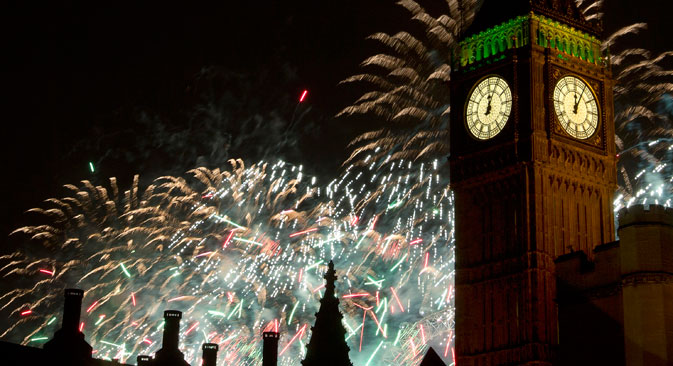
Fireworks and New Year's Eve have long been a part of Russian life. Source: AP
For those of us who grew up in Britain in the 1970s, fireworks only ever happened on Guy Fawkes Night, November 5.
Times change and the New Year display of fireworks has become hugely popular in London over the past few years.
It is now an event of international significance, as travel and tourism website travel.ru notes, in a story about a new charge that has been introduced for spectators who crowd onto the Embankment and Southbank of the river Thames to join in the fun.
Fireworks and New Year's Eve have long been a part of Russian life, even if they are a relatively recent coupling back home.
Alcohol-fuelled snogging
The first time I ever spent the last night of the year on Red Square was in the early '90s, a time when Russia was truly the 'wild east'. Crowds of drunken revellers were milling around swigging cheap champagne from the bottle and letting off fireworks without the slightest regard for their own, or others' safety.
The singing, dancing and alcohol-fuelled snogging created a heady combination of pheromones and gunpowder.
It was only when some bright spark hit upon the hilarious idea of putting a big firework inside an empty champagne bottle, which then exploded like a glass grenade sending razor sharp shards of shrapnel flying, that I realised it was time to go.
Fortunately for visitors to Russia today, that sort of behaviour is no longer seen at Moscow's famous parade ground that still houses Lenin's Mausoleum.
Avoiding unruly behaviour is probably behind London's decision to charge visitors £10 each to enter three specially policed locations during its fireworks display. For Russian tourists in London at the end of the year it will be a chance to see how well the Brits light up the night sky.
Fracking for gas
Fireworks of a different kind have been getting many across the country hot under the collar of late, although Russian coverage of England's fracking debate has tended to concentrate on the economic benefits of shale gas exploration. That is only fitting for the media of a country that is one the world's biggest sources of fossil fuels.
Russian financial website ru.investing.com picked up on a fresh development in a story that has ignited passions in those parts of Britain where the controversial drilling techniques for the shale gas reserves will take place, mostly in the north.
The story picked up on news of the government's latest carrot to persuade a sceptical public of the benefits of high pressure pumping deep underground to release natural gas trapped in ancient rocks.
Apart from the £100,000 community dividend and one percent of proceeds for every fracking site developed, Westminster now plans to set up a sovereign wealth fund that will divert a big share of the taxes earned from releasing the energy reserves.
The fund would ensure that wealth generate by fracking would not be frittered away, which touches on something that remains a sore spot for many British people: the way cash generated from North Sea oil in the 1970s and 80s was spent without a thought for the future.
North Sea production has now reached a level such that the UK has been a net importer of oil and gas for the past ten years, the report said. Fracking for shale gas, of which there are estimated reserves of 40 trillion cubic metres (1,300 trillion cubic feet), could create 64,500 jobs, it added.
With the price of a barrel of oil sliding to well below $80, the would-be investors who are the readers of ru.investing.com clearly need to be kept abreast of developments.
Heading for the exit
The fissures fracking may create in Britain's deep rocks are nothing to the yawning gulf the country's exit from the EU would cause, provincial Russian website penzanews.ru reports.
Quite why the debate raging over the UK's future within or without the EU should excite such interest in the provincial city of Penza is not clear, but in a lengthy and serious story based on a report by a leading British pro-Europe think-tank, Centre for European Reform, which describes itself as 'pro European, but not uncritical,' the key danger to continued British participation in the 28 member club is identified.
According to political pundit Simon Tilford, while those countries in Europe that use the Euro are still struggling economically, Britain with its pound sterling is beginning to boom again.
UKIP, the UK Independence Party that just won another parliamentary seat, stealing Rochester from the Tories after a by-election, is likely to use this economic argument as a prime reason why Britain would be better off outside the EU, he says.
Still, there is one part of British life that no amount of success, economic or otherwise, is likely to force out: Julian Assange.
The Australian-born founder of WikiLeaks, who has been holed up in the Ecuadorian embassy in London for two years in order to avoid extradition to Sweden on charges of rape, has been told he can stay as long as he wants, Russian state news agency TASS reports.
Assange once made a series of shows for Russia Today. If they need him again they know where to find him.
The opinion of the writer may not necessarily reflect the position of RBTH.
All rights reserved by Rossiyskaya Gazeta.
Subscribe
to our newsletter!
Get the week's best stories straight to your inbox